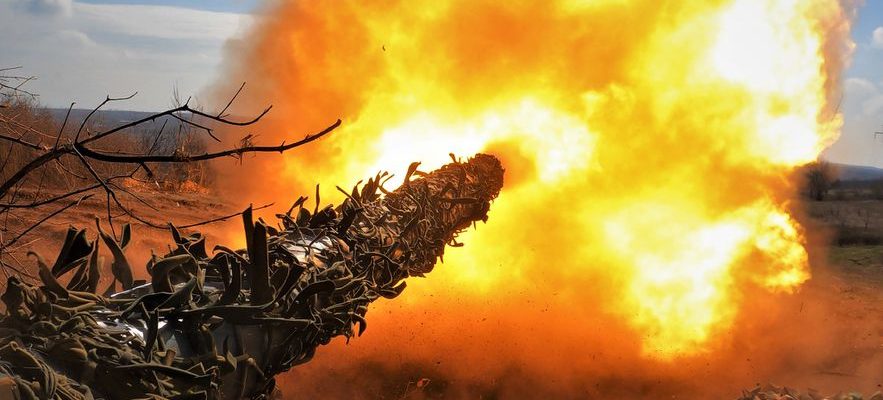After months of foot-to-foot combat, the boss of the Wagner group Evgueni Prigojine claimed on Saturday the complete capture of the city of Bakhmout, after a battle which “lasted 224 days”. In the process, Russian President Vladimir Putin “congratulated” the forces involved in “the completion of this operation” on which Moscow has focused most of its efforts since the summer. If Ukraine has not officially confirmed the loss of the city, the commander of the Ukrainian land forces, Oleksandre Syrsky, admitted on Sunday that his troops only controlled an “insignificant” part.
The epilogue of a bitter-tasting battle for the Russian forces involved in the conquest of the city. “Thousands of fighters fell to take this locality which is now in ruins, considers General (2S) Jérôme Pellistrandi, editor-in-chief of the National Defense Review. Given the extremely high price that was paid by Moscow, one can clearly speak of a Pyrrhic victory.” Since August 1, 2022, Russians and Ukrainians have clashed there in what has become one of the most bloody war.
Sent wave after wave to the front line, Prigojine’s mercenaries – massively recruited from Russian prisons – paid the heaviest price. “About 30,000 Russian fighters have been killed or wounded since the start of the battle for Bakhmout, British military adviser Ian Stubbs noted at the end of March. And the force dominated by Wagner has only advanced 25 km in during this period.” Earlier in the month, a NATO official estimated that Russian forces had lost at least five soldiers for every Ukrainian fallen in Bakhmout. A ratio that would even rise to seven to one, according to the Ukrainian authorities.
A Ukrainian T-72 tank fires on Russian positions on March 26, 2023 near Bakhmout (east)
© / afp.com/Sergey SHESTAK
Despite these vertiginous losses, the interest of taking the city seems relatively limited on the strategic level. “Its infrastructure has been destroyed, there is not much left of interest to the Russians, abounds General Pellistrandi. If only industrial buildings capable of hosting repair workshops for armored vehicles…” Surprise guest of the G7 summit in Hiroshima, Ukrainian President Volodymyr Zelensky confirmed this observation on Saturday: “Today, Bakhmout is simply in our hearts, there is nothing left”.
“Wagner’s mercenaries must be close to total exhaustion”
“Bakhmout was not intrinsically of great value, points out Michel Goya, a former colonel in the navy, now a war historian. From a purely geographical point of view, this city was above all an essential stopover before considering an offensive on Sloviansk and Kramatorsk.” Hard point of the Ukrainian defenses in the region, these two twin cities – of more than 100,000 inhabitants before the war – constitute today the main obstacle to the takeover of the Donetsk oblast by Putin. A goal still very uncertain at this stage. “If it took so long for the Russians to take Bakhmout, they are not about to seize it, slice Michel Goya. Especially since the area beyond Bakhmout is firmly held by the Ukrainians. “
Its topography should not facilitate new Russian advances either. “The terrain is crossed by many tributaries of the Dnieper, the crossing of which could prove extremely complex”, notes General (2S) Olivier de Bavinchove, former chief of staff of the international forces in Afghanistan. This is evidenced by painful precedents, such as the fiasco of the attempt to cross the Donets River by Russian forces in May 2022. Firmly awaited by Ukrainian artillery, they had deplored the loss of more than 400 men and nearly 80 shielded.
Ultimately, the Russian forces may have no choice but to mark time. “Wagner’s mercenaries must be close to total exhaustion and will probably not be able to be re-engaged immediately, judge General de Bavinchove. After such a violent fight, a break is necessary.” In an audio recording broadcast on Monday by his press service, Yevgueni Prigojine effectively affirmed that the Wagner group was going to withdraw from Bakhmout between May 25 and June 1, in order to cede its positions to the regular army. “On our side, we will return to the bases,” he had already indicated two days earlier. The fight for the city, however, may not be over. Ukrainian forces claimed on May 17 to have recaptured 20 km2 of land from Russian forces in recent days north and south of Bakhmout. Prelude before the major counter-offensive prepared by kyiv for months?
